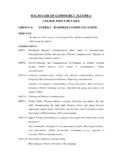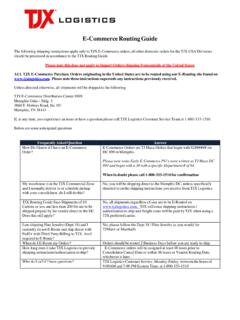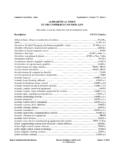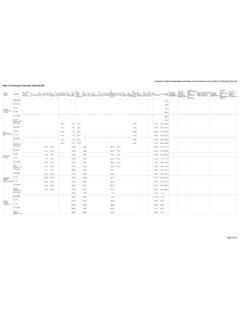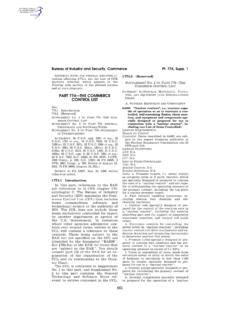Transcription of DEPARTMENT OF COMMERCE AND CONSUMER …
1 DEPARTMENT OF COMMERCE AND CONSUMER affairs AMENDMENTS AND COMPILATION OF CHAPTER 16-115 HAWAII ADIMINSTRATIVE RULES April 11, 2013 SUMMARY 1. 16-115-2 is amended. 2. 16-115-8 is amended. 3. 16-115-9 is amended. 4. 16-115-11 is amended. 5. 16-115-22 is amended. 6. 16-115-24 is amended. 7. 16-115-37 is amended. 8. 16-115-45 is amended. 9. 16-115-47 is amended. 10. 16-115-49 is amended. 11. 16-115-50 is amended. 12. 16-115-52 is amended. 13. 16-115-54 is amended. 14. 16-115-56 is amended. 15. 16-115-59 is amended. 16. 16-115-64 is amended. 17. 16-115-66 is amended. 18. 16-115-68 is amended. 19. 16-115-85 is amended. 20. 16-115-87 is amended. 21. 16-115-89 is amended. 22. Chapter 115 is compiled. This material can be made available for individuals with special needs.
2 Please call the Program Specialist, Professional and Vocational Licensing Division, DCCA, at 586-2692 to submit your request. Effective 5/23/13. HAWAII ADMINISTRATIVE RULES. TITLE 16. DEPARTMENT OF COMMERCE AND CONSUMER affairs . CHAPTER 115. PROFESSIONAL ENGINEERS, ARCHITECTS, SURVEYORS, AND. LANDSCAPE ARCHITECTS. Subchapter 1 General Provisions 16-115-1 Objective 16-115-2 Definitions 16-115-3 Notification and filing of names, addresses, and changes 16-115-4 Business entities 16-115-5 Display of certificate 16-115-6 Lost, destroyed, or mutilated certificate of licensure 16-115-7 Biennial renewal 16-115-8 Seal or stamp 16-115-9 Authentication: preparation or supervision of design and observation of construction 16-115-10 Misconduct in the practice 16-115-11 Oral testimony 16-115-12 Denial 16-115-13 Demand for hearing 16-115-14 Proceedings upon demand for hearing 16-115-15 Administrative practice and procedure Subchapter 2 Professional Engineers 16-115-21 Branches of engineering 16-115-22 Forms and instructions 16-115-24 Licensure by endorsement 16-115-26 Licensure by examination 16-115-27 Examination requirements for licensure 16-115-29 Passing score 16-115-31 E.
3 Xamination-fundamentals of engineering: qualifications, application, fees, required documents 16-115-33 E. xamination-professional engineering: qualifications, application, fees, required documents 16-115-35 E. xamination-professional engineering (additional branch): qualifications, application, fees, required documents 16-115-37 R. e-examination 16-115-39 L. awful experience Subchapter 3 Architects 16-115-45 Forms and instructions 16-115-47 Licensure by endorsement 16-115-49 Licensure by examination 16-115-50 Examination requirements for licensure 16-115-52 Passing score 16-115-54 Examination: qualifications, application, fees, documents required 16-115-56 Re-examination 16-115-58 Lawful experience 16-115-59 Intern development program Subchapter 4 Land Surveyors 16-115-64 Forms and instructions 16-115-66 Licensure by endorsement 16-115-68 Licensure by examination 16-115-69 E.
4 Xamination requirements for licensure 16-115-71 P. assing score 16-115-73 Examination-fundamentals of land surveying: qualifications, application, fees, required documents 16-115-75 E. xamination-professional land surveying: qualifications, application, fees, required documents 16-115-77 R. e-examination 16-115-79 L. awful experience Subchapter 5 Landscape Architects 16-115-85 Forms and instructions 16-115-87 Licensure by endorsement 16-115-89 Licensure by examination 16-115-2 16-115-90 Examination requirements for licensure 16-115-92 Passing score 16-115-94 Examination: qualifications, application, fees, documents required 16-115-96 Re-examination 16-115-98 Lawful experience Historical note: Chapter 16-115, Professional Engineers, Architects, Surveyors, and Landscape Architects, is based substantially upon chapter 16-82 of the rules of the Professional Engineers, Architects, Surveyors, and Landscape Architects.
5 [Eff 4/18/80; am and ren 2/13/81; am and comp 10/16/82; am and comp 11/22/86;. am 2/26/88; R 8/29/94]. SUBCHAPTER 1. GENERAL PROVISIONS. 16-115-1 Objective. This chapter is intended to clarify and implement chapter 464, Hawaii Revised Statutes, to the end that the provisions thereunder may be best effectuated and the public interest most effectively served. [Eff 8/29/94;. comp 10/26/01; comp 5/23/13] (Auth: HRS 464-7) (Imp: HRS 464-7). 16-115-2 Definitions. As used in this chapter: "Agricultural engineering" means that branch of professional engineering involving the design, construction, and use of specialized equipment, machines, structures, and materials relating to the agricultural industry and economy. It requires knowledge of the engineering sciences relating to physical properties and biological variables of foods and fibers; atmospheric phenomena as they are related to agricultural operations; soil dynamics as related to traction, tillage and plant-soil- water relationships; and human factors relative to safe design and use of agricultural machines.
6 The safe and proper application and use of agricultural chemicals and their effect on the environment are also concerns of the agricultural engineers. "Architect committee" means members of the board who are professional architects. "Branch examination" means a professional engineering examination which covers subjects within only one branch of professional engineering. The 16-115-2 branches of engineering examined in are agricultural, chemical, civil, electrical, industrial, mechanical, and structural. "Chemical engineering" means that branch of professional engineering which embraces studies or activities relating to the development and application of processes in which chemical or physical changes of materials are involved. These processes are usually resolved into a coordinated series of unit physical operations and unit chemical processes.
7 It is concerned with the research, design, production, operational, organizational, and economic aspects of the above. "Civil engineering" means that branch of professional engineering which embraces studies or activities in connection with fixed works for matters such as irrigation, drainage, waterpower, water supply, flood control, inland waterways, harbors (not including piers), municipal improvements, railroads, highways, traffic, non-structurally supported tunnels, airfields and airways, purification of water, geotechnical activities, and sewerage and refuse disposal. "CLARB" means Council of Landscape Architectural Registration Boards. "Consultation" means meetings, discussions, written or verbal messages, reports, etc., involving scientific, aesthetic or technical information, facts, or advice for purposes of planning, designing, deciding, or locating construction or alteration of structures, buildings, works, machines, processes, land areas, or projects.
8 "Design" means any procedure which conveys the plan, location, arrangement, intent, purpose, appearance, and nature of construction or alteration of existing or proposed buildings, structures, works, machines, processes, land areas, or projects. "Direct control" or "directly in charge of the professional work" means personal preparation, or direct supervision of the preparation and personal review, of all instruments of professional service. "Electrical engineering" means that branch of professional engineering which embraces studies or activities relating to the generation, transmission, and utilization of electrical energy, including the design of electrical, electronic, and magnetic circuits and the technical control of their operation and of the design of electrical gear.
9 It is concerned with research, organizational, and the economic aspects of the above. "Engineer committee" means members of the board who are professional engineers. "Experience in responsible charge" means direct control or personal supervision of engineering, architecture, landscape architecture, or land surveying work. "Evaluation" means careful search, examination, or inquiry to reveal, determine, or estimate the value, worth, merit, effect, efficiency, or practicability 16-115-2 of planning, design, location, construction, or alteration of existing or proposed structures, buildings, works, processes, land areas, or projects. "Full-time" means forty hours or more per week. "Geotechnical activities" means the investigation and engineering evaluation of earth materials including soil, rock, groundwater and man-made materials and their interaction with earth retention systems, structural foundations, and other civil engineering works.
10 The activities involve application of the principles of soil mechanics and the earth sciences, and requires a knowledge of engineering laws, formulas, construction techniques, and performance evaluation of civil engineering works influenced by earth materials. "IDP" means the intern development program of NCARB or other similar program satisfactory to the board. "Industrial engineering" means that branch of professional engineering involving the investigation, design, and evaluation of systems of persons, materials, and facilities for the purpose of economical and efficient production, use, and distribution. It requires the application of specialized engineering knowledge of the mathematical and physical sciences, together with the principles and methods of engineering analysis and design to specify, predict, and evaluate the results to be obtained from such systems.
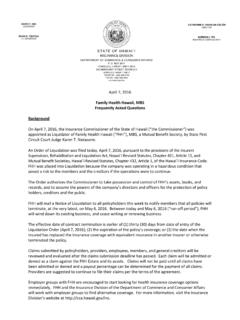

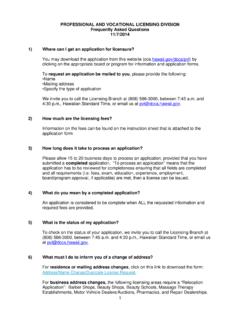

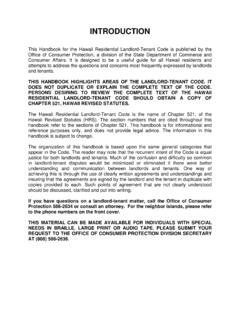
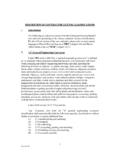
![CHAPTER 329 [NEW] UNIFORM CONTROLLED …](/cache/preview/7/b/4/1/8/2/d/e/thumb-7b4182de407585aa85cfb3800e495276.jpg)



